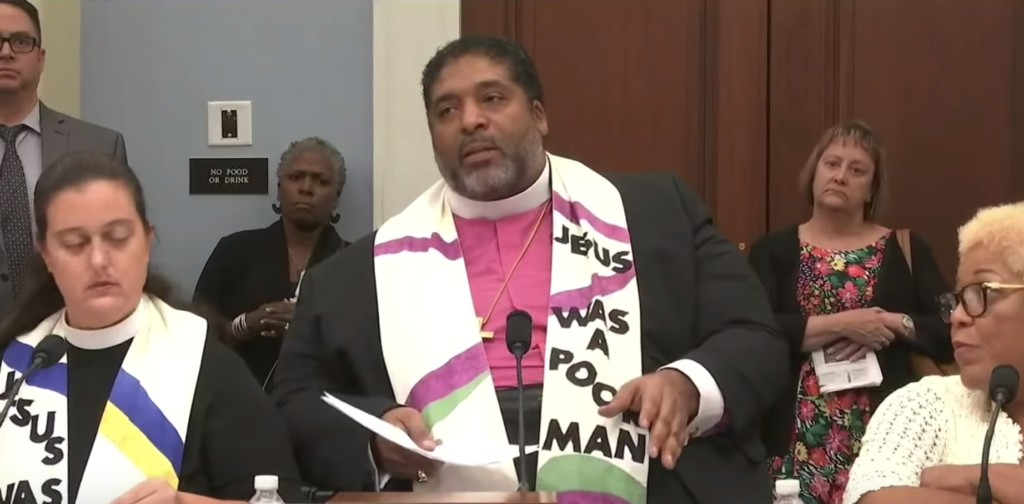Religious Left front man The Rev. Dr. William Barber is back in the news, this time intent on assailing capitalism as inherently unjust. Instead, the activist minister proposed Big Government wealth redistribution policies.
Last week Barber attended the House Budget Committee hearing on poverty in America on Capitol Hill. In his testimony to members of the committee, Barber lamented the growing gap between rich and poor “as a direct result of policy decisions, not the immorality and lack of personal work of poor people.”
Barber went on to criticize the personal responsibility and less government intervention approach to solving the issue of poverty. Barber advocated for a collective responsibility approach to fight inequality created by an unjust system. One can assume that Barber was referring to capitalism as the unjust system and was using the phrase collective responsibility as a way to implement policies that were – by definition – socialism and centered on the redistribution of wealth.
Barber’s argument for socialism and against capitalism was economically incorrect. He also incorrectly identified the number of people living in poverty in America. Barber claimed in his testimony that 140 million people, 43.5 percent of the population were living in poverty in America but official statistics state that as of 2017 the number is around 39.7 million or about 12.3 percent. The ordained Christian Church (Disciples of Christ) pastor went on to use biblical arguments to justify the redistribution of wealth.
In response to Representative Bill Johnson (R-OH) stating that nowhere in the scripture does Jesus command Caesar to feed the poor or materially provide for widows; Barber lectured Johnson that he had not read the 2,000 verses in the Bible that address how nations should treat the poor, immigrants, etc.
Barber claimed that God’s first speech was relaying the good news to the Ptokos (the destitute) whom Barber incorrectly identified as “those who have been made poor by the economic system.” Scripture does not define Ptokos as those made poor by the economic system, but rather those who are totally destitute, regardless of the economic system that governs their communities. It is important to point out this distinction because Barber is trying to use capitalism as a scapegoat to justify the implementation of socialist policies on biblical grounds.
Barber goes on to incorrectly state that the Bible is referring to nations taking care of the poor, not the communities or churches. This is refuted by the parable of the Good Samaritan in Luke 15. Jesus preaches constantly to his followers about their responsibility as neighbors and followers of Christ to care for the poor and serving “the least of these,” in the parable of the Sheep and Goats in Matthew 25:31-46.
It is clear from the reading of scripture that Jesus wants the Church and communities to take care of the poor, not the government forcing its citizenry to redistribute their wealth. From a purely biblical perspective, socialism is not the answer. Charity, as directed by Jesus, was supposed to be voluntary and by the citizenry — not forced on the citizenry by the government.
As the co-chair of the Poor People’s Campaign, Barber claims that the organization’s values and policy proposals are guided by the religious values of the prophet Isaiah. What part of the book of Isaiah called for the government to force redistributionist policies on its citizenry? What part called for free healthcare, government bailouts of failing businesses, and an increase in what Barber calls “the living wage”?
Barber correctly identified corruption and financial influence in politics that has led to the inequality between social classes. It is important to recognize that capitalism in the form of crony capitalism is not economically productive or Biblically correct. In this hedonistic and sin-filled world capitalism is the best system available to us. Barber also fails to mention how capitalism has lifted millions of people out of poverty particularly in Asia. But he wrongly attributed the cause of inequality and poverty to capitalism and gave a flawed biblical solution. Capitalism isn’t the problem and socialism isn’t the answer. It’s one thing to have economic misconceptions and justifications for socialism but it is a different thing to use the inerrant word of God, especially as a pastor, to spread biblical falsehoods to promote a political agenda.





Comment by James H. on June 26, 2019 at 9:48 pm
Of course capitalism is unjust. It rewards the industrious and thrifty and punishes the lazy and irresponsible. Our form of capitalism is so distorted by policies to guarantee “equal outcome” over “equal opportunity” that it’s no wonder the gap between rich and poor is growing ever wider. The Reverend’s economics are a charade that ignores human behavior, the social safety net was never intended to become a hammock…or was it? What better way to destroy the social fabric of the middle class than to introduce perverse economic incentives under the guise of Justice and equality.
Comment by Pat on June 27, 2019 at 3:16 pm
Thank you! You are correct in your assessment!
Comment by Donald on June 28, 2019 at 4:31 pm
Memo to “Pastor” Barber -Sir, it looks like you don’t miss many meals! May I at first suggest that you do those ‘pushing-away-from-the-table’ push ups if you’re worried about “The Poor” and “The Children” going hungry.
Second, since you believe in the redistribution of other people’s wealth, let’s see just how much you tithe from your obviously greater-than-poverty-level salary?! I hope you drive a very old car rather than anything from the later than the year 2009.
Third, I hope that you’re paying your own mortgage rather than living in a ‘parsonage’ that is provided for you by other peoples’ money (Oh! Excuse me!! You probably ARE living in such a building, which is where you got used to having other people pay what for the rest of us is our biggest single expense.